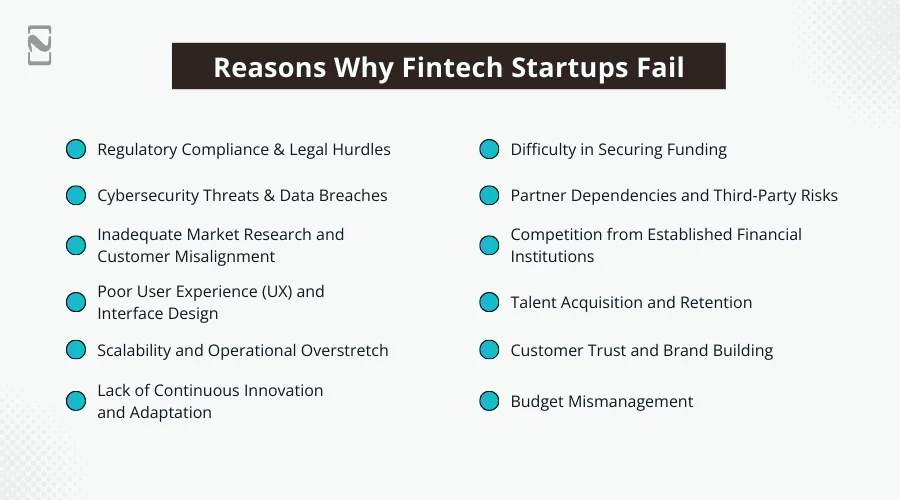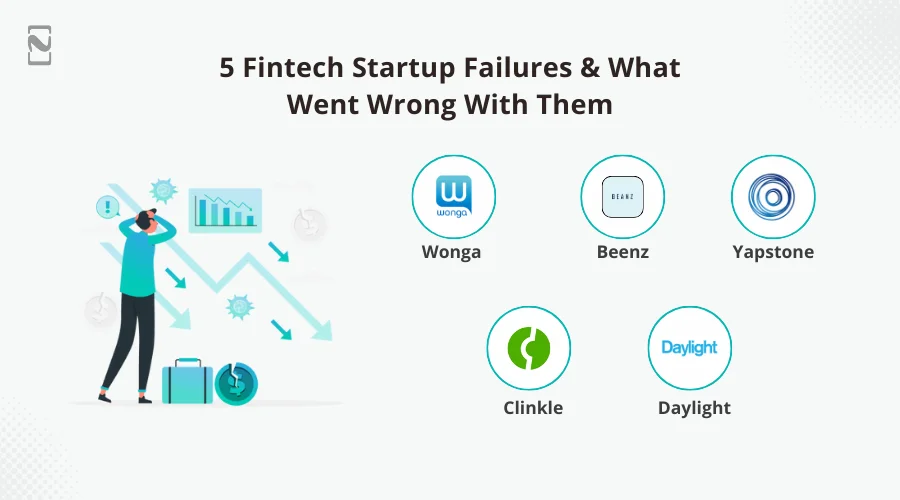Building your business from scratch takes a lot of guts. And stakes become even higher and tougher when you plan to start a fintech business.
Financial technology, or fintech, is one of the fastest-growing markets in the world right now.
The entire globe is going through a revolution in the ways people manage their funds, make payments, collect and send money, etc., and fintech is at the center of it all.
While there are over 30,000 fintech startups today, a greater number have failed before they could reach their potential.
The fintech industry is filled with huge challenges that manifest in the form of regulations, competition, and so on.
If you want to start a fintech business, you must understand why fintech startups fail.
In this blog, we shall be doing just that.
Getting right into it, let’s start by understanding the reasons why most fintech startups fail in the market:
Reasons Why Fintech Startups Fail
Launching a fintech startup is an endeavor filled with both opportunity and significant risk.
While the sector promises revolutionary changes to how we handle money, many pitfalls await those unprepared.

Below, we discuss key challenges that frequently derail fintech startups:
1. Regulatory Compliance and Legal Hurdles
Fintech companies operate in one of the most tightly regulated sectors.
The intricate web of financial regulations varies not only from country to country but also often between regions within countries.
For example, startups like Robinhood have faced regulatory challenges that have delayed product launches and incurred fines.
Compliance is not just about following the laws; it’s about anticipating changes in the legal landscape. Failing to do so can result in severe penalties, operational disruptions, and damage to reputation.
Therefore, you must engage with legal experts and regulators if you don’t want your fintech startup to fail.
2. Cybersecurity Threats and Data Breaches
The digital nature of fintech makes it a prime target for cyberattacks.
A breach can compromise sensitive customer data and result in substantial financial losses as well as regulatory penalties.
The 2019 breach at Capital One exposed the data of over 100 million customers, underscoring the devastating consequences of cybersecurity failures.

For fintech startups, investing in robust cybersecurity measures from the outset is non-negotiable.
This includes everything from secure coding practices to regular audits and compliance with international security standards.
3. Inadequate Market Research and Customer Misalignment
Many fintech startups develop products based on what they think the market wants, without sufficient market research.
This is one of the biggest reasons why a fintech startup fails.
This misalignment can lead to product offerings that do not effectively address real customer needs or problems.
For instance, if a fintech app is designed with sophisticated trading tools aimed at seasoned investors but marketed to the general public, it may see low adoption rates due to its complexity.
Comprehensive market research, involving potential user interviews, surveys, and pilot testing, is essential to understanding and meeting your target audience’s needs.
4. Poor User Experience (UX) and Interface Design
The success of the solution heavily relies on its user experience, as well as the fintech app’s design.
An interface that is difficult to navigate can frustrate users and lead to high churn rates.
A notable example is the initial release of the Google Wallet, which faced criticism for its user interface being less intuitive compared to competitors like Apple Pay.
Thus, a focus on clean, simple, and intuitive design principles, along with thorough user testing, can help ensure that the app meets user expectations.
Also Read: Google Pay, Apple Pay, & Samsung Pay
5. Scalability and Operational Overstretch
If you want your app to be successful among people, scalability is the key.
However, it is also a significant challenge, particularly as a startup grows, which may cause failure.
Fintech startups often struggle with scaling their technology infrastructure and operational capabilities in line with their growing user bases.

Take the example of a fintech company expanding its services to international markets without adequately scaling its customer service or localization features, leading to user dissatisfaction and operational chaos.
Effective scaling involves strategic planning, investment in technology, and sometimes, a phased approach to expansion to manage growth sustainably.
6. Lack of Continuous Innovation and Adaptation
In the rapidly evolving fintech sector, continuous innovation is key to staying relevant.
Startups that fail to innovate or adapt to new technologies and market demands quickly become obsolete.
Consider the rise and fall of P2P payment apps that failed to evolve beyond simple transaction capabilities, or newer apps combined with social features or investment options.
Keeping a pulse on industry trends, investing in research and development, and being ready to pivot are crucial strategies for maintaining a competitive edge.
If not, it can be a prime reason behind fintech businesses’ failure.
7. Difficulty in Securing Funding
Securing adequate funding is a major hurdle for many fintech businesses.
Investors are often hesitant to fund businesses in such a regulated and competitive market without clear signs of potential for high returns.
For example, a fintech startup specializing in blockchain technology might struggle to find investors if its product is too niche or if the market sentiment around blockchain is negative.
To overcome this and avoid company failure, you must not only have a solid business plan but also be able to effectively communicate the unique value proposition of your product and demonstrate a clear path to profitability.
Also Read: Top Fintech Startup Ideas
8. Partner Dependencies and Third-Party Risks
Many fintech products rely on partnerships with traditional banks or other financial institutions in the form of fintech APIs and open banking.
This can lead to dependency risks.
For instance, if a major bank that provides the banking infrastructure for your payment app changes its terms or decides to launch its competing service, it could significantly disrupt your business operations.
In addition, relying on third-party vendors for critical components like payment processing or data storage introduces risks related to service outages or data breaches.
Establishing a diversified portfolio of partners and vendors and developing contingency plans are essential steps to mitigate these risks.
9. Competition from Established Financial Institutions
The sector is not only crowded with super successful fintech apps but also increasingly contested by traditional financial institutions that are digitizing their services.
For example, when major banks started offering free online banking services, it undercut the value proposition of many fintech startups that charged fees for similar services.
To compete effectively, you need to offer something uniquely valuable that established players cannot easily replicate, such as superior technology, better customer service, or innovative features.
10. Talent Acquisition and Retention
Building a successful fintech requires not just a great idea but also a team capable of executing it.
However, competing with larger companies and other tech startups for top talent in areas like software development, cybersecurity, and regulatory compliance can be challenging.

For instance, a fintech startup in a small city may struggle to attract talent away from the lure of big tech companies in major hubs.
Offering competitive compensation, a compelling work culture, and growth opportunities can help attract and retain the high-caliber employees necessary for your success.
Also Read: User Retention in Payment Apps
11. Customer Trust and Brand Building
Lastly, a big mistake people make is not focusing on mobile app marketing.
After all, gaining the trust of customers is particularly challenging in the financial sector.
New fintech startups often face skepticism from consumers who are reluctant to switch from their traditional banks to a new, relatively untested provider.
Building a trustworthy brand involves not only ensuring the highest security standards but also actively engaging with customers, being transparent about your business practices, and consistently delivering excellent service.

For example, successful fintechs like Revolut have managed to build trust through robust security measures in fintech, transparent pricing, and responsive customer support.
You may be shocked to know that several players in the fintech realm have already experienced this. In case you are taking these challenges lightly, don’t, as they have eventually cost millions of dollars to enterprises that began their journey in fintech but could not survive.
Check out the next section to understand more about some of them and identify the key mistakes they made so you can avoid them.
12. Budget Mismanagement
From starting your research to promoting the final product, you will have multiple expenditures to take care of.
If you are unable to manage these steps and go overboard in one or another, you might face issues.
For instance, suppose you hired a team of fintech developers who charge you more than the market price, or you do not manage the budget closely and end up spending a lot more than what you expected.

Now, with a major chunk of your budget gone, you will have nothing to spend on your marketing, which is the key player in launching a new app.
On the other hand, if you become too particular about costs that you end up choosing a less experienced and professional development team, you might not get the desired results, wasting the money you spent.
Hence, make sure you research the cost of fintech app development and hire the best developers that fit your budget.
5 Fintech Startup Failures & What Went Wrong With Them
Fintech as an industry is unpredictable. No one can point and say what will work and what will not. While a few have seen the pinnacle of success in fintech, many have been unlucky and could not make it big.

Here are 5 examples of fintech startups that could not make it big due to different challenges that came in their journey-
● Wonga
What started as an industry-defining payday loans app targeting the UK slowly turned into a nightmare for the investors and owners. The application promised access to convenient loans by assessing user data and identifying their needs through their applications.
What went wrong: The proposition of the application that suggests payday loans and other lending practices could not comply with the necessary regulations, and ended up being fined for irresponsible lending practices. The compensation that they had to give out led to the company, causing issues to several users.
● Beenz
For any business planning to enter the fintech market, Beenz is the first-ever case study that shows what not to do.
Started in the late 90s, Beenz was one of the first digital currency platforms that allowed users to collect Beenz by participating in different online games, surveys, and other activities.
The whole concept was that the Beenz they earn can be easily used on the partner websites.
What went wrong: Poor market analysis led to a lack of traction and adoption of the digital currency. This further resulted in the decline of the whole enticing but unclear concept, which directly shows that identifying the value proposition that connects with the customer and is clear at all fronts is a must for a thriving fintech business.
● Yapstone
Yapstone started its journey as a payment processor specialising in rental and property transactions. While it focused on these transactions and converted into its niche, it still had to face immense competition.
What went wrong: Not understanding the volume of competition is certainly an issue that makes it more difficult to survive in cutthroat competition. Market analysis and research could have saved them, however, they were also caught up in compliances, which made survival harder and sent them out of business.
● Clinkle
With a proprietary technology that was set out to disrupt the payments market, Clinkle was the talk of the town for several years.
From their early days, Team Clinkle got a lot of support from the startup ecosystem as they were able to close multiple rounds of funding.
However, due to internal rifts in the team and the misalignment of thoughts led to multiple delays in release, further making it difficult for them to revive their business.
What went wrong: Clinkle is a classical example of why you need a solid team to back your vision. Transparency with stakeholders was lost, and the confidence of company took a hit due to internal conflicts. When this happens, people tend to question the integrity of the business, and the same happened with Clinkle.
● Daylight
Capitalizing on the rising awareness of LGBTQ+ rights, Daylight decided to offer an LGBTQ+ banking platform, focusing on inclusivity in the financial sector.
Their idea was to create financial transparency and services for LGBTQ+ communities and address their unique financial needs.
What went wrong: As mentioned earlier, your leadership and the persona you build in the market also make a difference. Daylight is the perfect example of why you need proper leadership. The founder was accused of misconduct, which led to the downfall of the brand as a whole.
While all these endings are discouraging to any founder. They also give insights on what things you should avoid and why exactly the startups fail.
Knowing about the things that matter is crucial. While every fintech startup is looking for ways they can disrupt the market from day one, it is important to understand things that they should avoid.
Nimble AppGenie, Your Partner in Fintech Success
One of the key aspects of building your own fintech empire is to have a team that understands your vision and helps you achieve it.
Fintech applications are all about complex technologies being used to simplify financial services. Hence, what you need is a solid fintech app development partner that gets the job done for you.
With a robust portfolio of over 350+ projects, including successes like Pay By Check, DafriBank, SatPay, CUT, and SatBorsa, Nimble AppGenie can be an ideal partner in navigating the fintech landscape.
Our expertise in creating user-centric digital solutions ensures that your app not only meets but exceeds user expectations.
Whether it’s an e-wallet platform or a digital banking app, our tailored approach is designed to foster growth and enhance user engagement.
Let’s build something remarkable together and set your startup on a path to success in the dynamic world of financial technology. Connect with us today to see how your project can be the next big thing in fintech.
Conclusion
It may be difficult to digest, but the truth is that the road to success is full of short failures that you might come across. Several factors may cause you to fail miserably.
However, keep in mind that with focus and understanding of what you should not do is equally important as what you should, and that is why knowing why fintech startups fail can be your first step towards success.
With that said, we have reached the end of this post, hopefully, you find it helpful in your journey. Thanks for reading. Good Luck!
FAQs
Fintech startups often face failure due to several key reasons:
- Including regulatory compliance issues
- Cybersecurity threats
- Poor market fit
- Scalability problems
- Operational challenges
Failure to navigate these complexities can lead to financial loss, diminished customer trust, and ultimately, business closure.

Niketan Sharma, CTO, Nimble AppGenie, is a tech enthusiast with more than a decade of experience in delivering high-value solutions that allow a brand to penetrate the market easily. With a strong hold on mobile app development, he is actively working to help businesses identify the potential of digital transformation by sharing insightful statistics, guides & blogs.
Table of Contents




No Comments
Comments are closed.